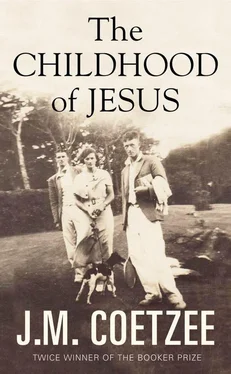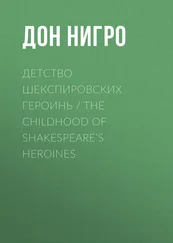Ana frowns. ‘If you don’t remember your mama’s name, can you tell us what she looks like? Can you draw a picture of her?’
The boy shakes his head.
‘So your mama is lost and you don’t know where to look for her.’ Ana pauses to reflect. ‘Then how would you feel if your padrino began looking for another mama for you, to love and take care of you?’
‘What is a padrino ?’ asks the boy.
‘You keep slotting me into roles,’ he interrupts. ‘I am not David’s father, nor am I his padrino . I am simply helping him to be reunited with his mother.’
She ignores the rebuke. ‘If you found yourself a wife,’ she says, ‘she could be a mother to him.’
He bursts out laughing. ‘What woman would want to marry a man like me, a stranger without even a change of clothing to his name?’ He waits for the girl to disagree, but she does not. ‘Besides, even if I did find myself a wife, who is to say she would want — you know — a foster child? Or that our young friend here would accept her?’
‘You never know. Children adapt.’
‘As you keep saying.’ Anger flares up in him. What does this cocksure young woman know about children? And what entitles her to preach to him? Then suddenly the elements of the picture come together. The unbecoming clothes, the baffling severity, the talk of godfathers — ‘Are you a nun, Ana, by any chance?’ he asks.
She smiles. ‘What makes you say that?’
‘Are you one of those nuns who have left the convent behind to live in the world? To take on jobs that no one else wants to do — in jails and orphanages and asylums? In refugee reception centres?’
‘That is ridiculous. Of course not. The Centre isn’t a jail. It isn’t a charity. It is part of Social Welfare.’
‘Even so, how could anyone put up with a never-ending stream of people like us, helpless and ignorant and needy, without faith of some kind to give her strength?’
‘Faith? Faith has nothing to do with it. Faith means believing in what you do even when it does not bear visible fruit. The Centre is not like that. People arrive needing help, and we help them. We help them and their lives improve. None of that is invisible. None of it requires blind faith. We do our job, and everything turns out well. It is as simple as that.’
‘Nothing is invisible?’
‘Nothing is invisible. Two weeks ago you were in Belstar. Last week we found you a job at the docks. Today you are having a picnic in the park. What is invisible about that? It is progress, visible progress. Anyway, to come back to your question, no, I am not a nun.’
‘Then why the asceticism that you preach? You tell us to subdue our hunger, to starve the dog inside us. Why? What is wrong with hunger? What are our appetites for if not to tell us what we need? If we had no appetites, no desires, how would we live?’
It seems to him a good question, a serious question, one that might trouble the best-schooled young nun.
Her answer comes easily, so easily and in so low a voice, as if the child were not meant to hear, that for a moment he misunderstands her: ‘And where, in your case, do your desires lead you?’
‘My own desires? May I be frank?’
‘You may.’
‘With no disrespect to you or to your hospitality, they lead me to more than crackers and bean paste. They lead, for instance, to beefsteak with mashed potatoes and gravy. And I am sure this young man’ — he reaches out and grips the boy’s arm — ‘feels the same way. Don’t you?’
The boy nods vigorously.
‘Beefsteak dripping with meat juices,’ he goes on. ‘Do you know what surprises me most about this country?’ A reckless tone is creeping into his voice; it would be wiser to stop, but he does not. ‘That it is so bloodless. Everyone I meet is so decent, so kindly, so well-intentioned. No one swears or gets angry. No one gets drunk. No one even raises his voice. You live on a diet of bread and water and bean paste and you claim to be filled. How can that be, humanly speaking? Are you lying, even to yourselves?’
Hugging her knees, the girl stares at him wordlessly, waiting for the tirade to end.
‘We are hungry, this child and I.’ Forcefully he draws the boy to him. ‘We are hungry all the time. You tell me our hunger is something outlandish that we have brought with us, that it doesn’t belong here, that we must starve it into submission. When we have annihilated our hunger, you say, we will have proved we can adapt, and we can then be happy for ever after. But I don’t want to starve the dog of hunger! I want to feed it! Don’t you agree?’ He shakes the boy. The boy burrows in under his armpit, smiling, nodding. ‘Don’t you agree, my boy?’
A silence falls.
‘You really are angry,’ says Ana.
‘I am not angry, I am hungry! Tell me: What is wrong with satisfying an ordinary appetite? Why must our ordinary impulses and hungers and desires be beaten down?’
‘Are you sure you want to carry on like this in front of the child?’
‘I am not ashamed of what I am saying. There is nothing in it that a child needs to be protected from. If a child can sleep outdoors on the bare earth, then surely he can hear a robust exchange between adults.’
‘Very well, I will give you robust exchange back. What you want from me is something I don’t do.’
He stares in puzzlement. ‘What I want from you?’
‘Yes. You want me to let you embrace me. We both know what that means: embrace . And I don’t permit it.’
‘I said nothing about embracing you. And what is wrong with embraces anyway, if you are not a nun?’
‘Refusing desires has nothing to do with being or not being a nun. I just don’t do that. I don’t permit it. I don’t like it. I don’t have an appetite for it. I don’t have an appetite for it in itself and I don’t wish to see what it does to human beings. What it does to a man.’
‘What do you mean, what it does to a man ?’
She glances pointedly at the child. ‘You are sure you want me to go on?’
‘Go on. It is never too early to learn about life.’
‘Very well. You find me attractive, I can see that. Perhaps you even find me beautiful. And because you find me beautiful, your appetite, your impulse, is to embrace me. Do I read the signs correctly, the signs you give me? Whereas if you did not find me beautiful you would feel no such impulse.’
He is silent.
‘The more beautiful you find me, the more urgent becomes your appetite. That is how these appetites work which you take as your lodestar and blindly follow. Now reflect. What — pray tell me — has beauty to do with the embrace you want me to submit to? What is the connection between the one and the other? Explain.’
He is silent, more than silent. He is dumbfounded.
‘Go on. You said you would not mind if your godson heard. You said you wanted him to learn about life.’
‘Between a man and a woman,’ he says at last, ‘there sometimes springs up a natural attraction, unforeseen, unpremeditated. The two find each other attractive or even, to use the other word, beautiful. The woman more beautiful than the man, usually. Why the one should follow from the other, the attraction and the desire to embrace from the beauty, is a mystery which I cannot explain except to say that being drawn to a woman is the only tribute that I, my physical self, know how to pay to the woman’s beauty. I call it a tribute because I feel it to be an offering, not an insult.’
He pauses. ‘Go on,’ she says.
‘That is all I want to say.’
‘That is all. And as a tribute to me — an offering, not an insult — you want to grip me tight and push part of your body into me. As a tribute, you claim. I am baffled. To me the whole business seems absurd — absurd for you to want to perform, and absurd for me to permit.’
Читать дальше












